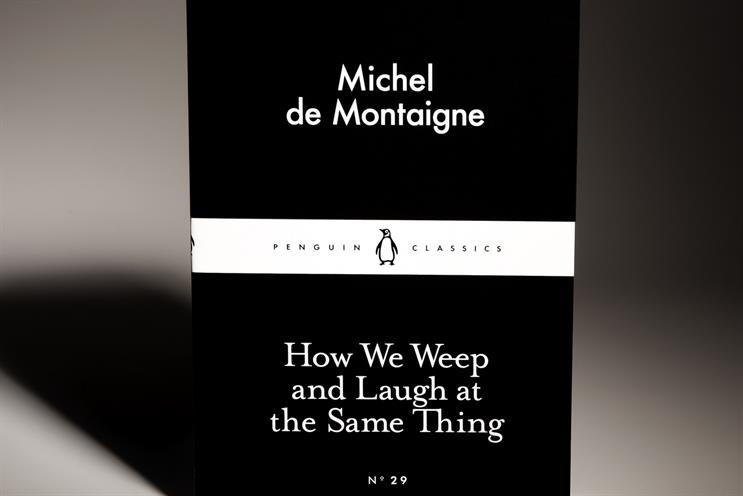
Today takes us to Renaissance Europe, and to the master of the essay, Michel de Montaigne.
The collection takes its name from the leading essay, How We Weep and Laugh at the Same Thing, and this essay alone is reason enough for marketers to find a 16th century space in their bookshelves. It deals, as the title suggests, with the subtle and contradictory nature of human emotions, and it hones in on the phenomenon that we nowadays refer to as mixed emotion.
When a disgraced politician steps down to spend more time with his family, his resignation speech is likely to contain a phrase along the lines of ‘it is with mixed emotion that I say goodbye to Whitehall.’ In this context mixed emotion indicates that he is torn, that his departure has been a dilemma, and that he therefore feels both happy and sad because the decision is both desirable and regrettable.
This is the blunt meaning that the phrase has acquired, but Montaigne’s observation was far subtler. To him, emotions do not co-exist in a blended limbo state, they are independent and contradictory and we alternate between them as the mercurial logic of our consciousness unfolds.
Emotion and creativity’s ability to access it has long been a focus of marketing, yet Montaigne’s essay reminds us of the dangers of interpreting human emotion in too simplistic or unambiguous a way. The truth, he suggests, is that our thoughts and feelings dart undetectably from one place to the next, and that any powerful stimulus is likely to have an ambivalent effect as one perspective yields to another, allowing grief and relief, for example, to cohabit in our overall response to an event.
Ambivalence then is often the result of a strong emotional response. Yet when respondents in a focus group display ambivalence, we tend to believe that they think our ideas are a bit meh. The fact is, the most stirring music is often best described as both happy and sad. We often cry at films without knowing exactly whether it is the overcoming of tragedy or the tragedy itself that is causing the tears to flow. Grief triggers such a network of feelings that we can only deal with it comprehensively by moving through numerous well-documented gears. The raw solemnity of the two-minute silence can provoke nervous laughter even in the most humane and patriotic among us.
The great pontificator of Aquitaine puts his finger on something which marketing at its most binary has a tendency to overlook. We smile when we are sad and we laugh when we are happy and we will always be contradictory bundles of emotion. The ideas that best penetrate our emotional defenses are not happy ideas or sad ideas but simply ideas that cut across the grain of our human condition and trigger a chain reaction.
Giles Hedger is the chief strategy officer at Leo Burnett London & Worldwide.
Read the full 80 Books in 80 Days series here


.jpg)


.jpg)